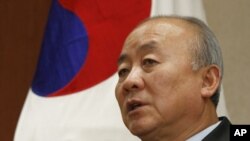Despite the provocative rocket launch by North Korea last Friday, South Korea is to continue providing humanitarian aid to its impoverished neighbor, with whom it remains technically at war.
Private aid agencies
South Korea's key official dealing with Pyongyang says his government is not cutting off humanitarian assistance to the North.
Unification Minister Yu Woo-ik says while other punitive steps will be taken against Pyongyang for the missile launch, Seoul is allowing private relief agencies to continue providing aid for vulnerable people in North Korea.
Kang Young-sik is general secretary of the Korean Sharing Movement, an umbrella group of non-governmental organizations sending such aid to the North.
Kang says private humanitarian organizations were worried that following the rocket launch, the Unification Ministry would order them to cut assistance to North Korea, so he is relieved by the announcement.
Aid agencies say malnourishment is widespread, especially among children, in the North.
South Korea's government has harshly condemned last Friday's rocket launch, saying the money spent on building and trying to fire missiles could feed millions of hungry people in North Korea.
The United Nations Security Council, on Monday, announced that sanctions would be tightened on North Korea for the launch, which it deemed a violation of previous U.N. resolutions.
China eases repatriating policy
Meanwhile, South Korean government ministries say they have received no confirmation China has stopped, at least temporarily, repatriating North Koreans.
A Japanese newspaper, Yomiuri, says an unnamed Chinese official in Liaoning province told its reporter such forced returns of North Koreans to their home country had stopped.
The newspaper says the suspension reflects China's displeasure with North Korea for the controversial rocket launch.
Ahead of the launch, China permitted five North Korean defectors to leave for South Korea. The North Koreans had long been holed up in South Korea's Embassy in Beijing to avoid arrest.
South Korea and international rights groups have called on China to alter its policy, saying those sent back to North Korea face retribution, possibly including death sentences.
The two Koreas have no diplomatic relations. They technically remain at war as they never signed a peace treaty following a devastating three-year conflict in the early 1950s.




